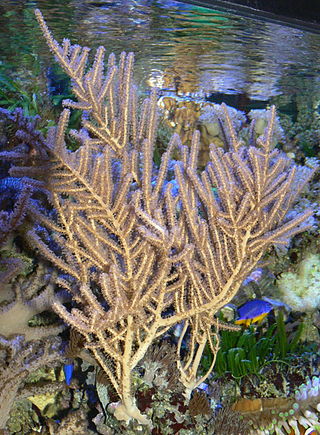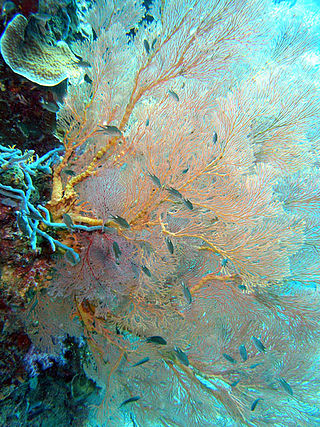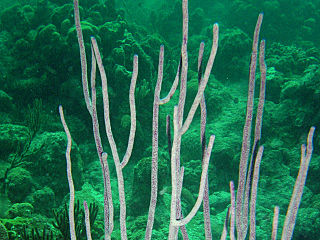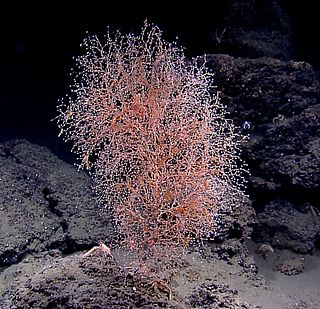
Acanella is a genus of deep sea bamboo coral of the family Isididae. Acanella are mainly studied and found in Hawaii, they are able to survive in high-flow sites and are preyed upon by nudibranch mollusks. It has a high fecundity and small size that allows high dispersal and recruitment; however, it has been classified as a vulnerable marine organism due to its vulnerability to bottom fishing gear. It contains the following species:

Lepidisis is a genus of deep-sea bamboo coral in the family Isididae. It contains the following species:

Keratoisis is a genus of deep-sea bamboo coral in the family Isididae, containing the following species:
Parisis is a genus of corals in the monotypic family Parisididae.

Holaxonia is a suborder of soft corals, a member of the phylum Cnidaria. Members of this suborder are sometimes known as gorgonians and include the sea blades, the sea fans, the sea rods and the sea whips. These soft corals are colonial, sessile organisms and are generally tree-like in structure. They do not have a hard skeleton composed of calcium carbonate but have a firm but pliable, central axial skeleton composed of a fibrous protein called gorgonin embedded in a tissue matrix, the coenenchyme. In some genera this is permeated with a calcareous substance in the form of fused spicules. Members of this suborder are characterized by having an unspiculated axis and often a soft, chambered central core. The polyps have eight-fold symmetry and in many species, especially in the families Gorgoniidae and Plexauridae, contain symbiotic photosynthetic algae called zooxanthellae. These soft corals are popular in salt water aquaria.

Melithaea is a genus of octocorals in the family Melithaeidae. Members of the genus are commonly known as fan corals and are found in the tropical Indo-Pacific region. The type species is Melithaea ochracea.

Dendronephthya is a genus of soft corals in the family Nephtheidae. There are over 250 described species in this genus. They are sometimes kept in aquariums, but are notoriously difficult to keep, requiring a near constant supply of small foods such as phytoplankton.

Alcyonium is a genus of soft corals in the family Alcyoniidae.

Primnoidae is a family of soft corals.

Plexauridae is a family of marine colonial octocorals in the phylum Cnidaria. Members of this family are found in shallow tropical and subtropical seas. Many species contain symbiotic photosynthetic protists called zooxanthellae.

Siphonogorgia is a genus of soft corals in the family Nidaliidae. Like other members of this family, these corals do not contain symbiotic zooxanthellae.

Anthomastus is a genus of soft corals in the family Alcyoniidae.

Heteropolypus is a genus of soft corals in the family Alcyoniidae.

Ellisella, commonly known as sea whip, is a genus of soft coral in the family Ellisellidae.

Clavularia is a genus of corals in the family Clavulariidae. They are often referred by the common names star polyps or clove polyps.

Chrysogorgia is a genus of soft corals in the family Chrysogorgiidae.
Primnoeides is a genus of Cnidaria in the family Primnoidae.

Narella is a genus of deep-sea soft corals in the family Primnoidae (Milne Edwards, 1857). They are sessile, bottom-dwelling organisms that can be found in all ocean basins, having cosmopolitan distribution. They have a branching appearance.
Scleronephthya is a genus of corals belonging to the family Nephtheidae.

Parastenella is a genus of cnidarians belonging to the family Primnoidae.


















